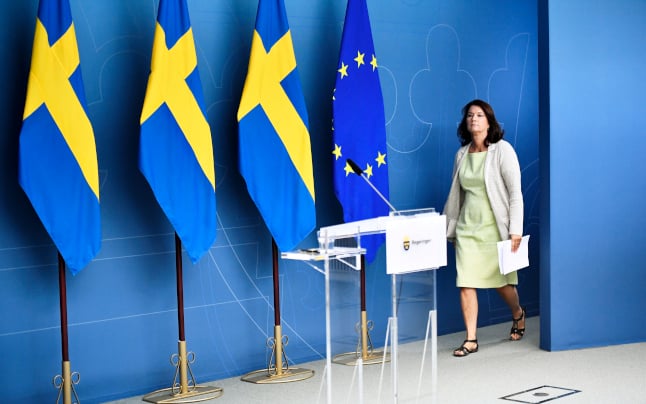Since the Taliban seized power in Afghanistan, local embassy staff, interpreters, and other allies of Western countries are at serious risk of persecution. Many governments have taken steps to ensure allies in the country are evacuated and receive asylum. Yet Sweden has mostly failed to ensure the safety of Afghans who worked for Swedish organisations. The reason has to do with the unique nature of the Swedish Constitution.
Denmark, which hardly welcomes refugees, will provide protection to approximately 200 Afghans who were employed by the Danish Embassy or Armed Forces. The Swedish government, however, is adamant that this approach is impossible. “We do not have that system. In Sweden, it is the authorities who examine the applications for residence permits,” said Ann Linde, the Social Democrats’ Minister for Foreign Affairs.
It emerged on Monday that Swedish diplomats in Kabul had been flown to safety, but Linde could not say what would happen to local embassy staff who remained.
The government is looking for these individuals, but they may struggle to leave the country. Minister of Justice Morgan Johansson says that the government is adjusting the regulations to allow applications for resettlement. It will then be up to the Swedish Migration Agency to determine whether they receive asylum through the UN quota system.
Despite criticism from the opposition, Johansson and Linde are adamant that the government cannot intervene in individual cases. They are correct. The Instrument of Government, a core text of the Swedish Constitution, prohibits parliament from determining how an administrative authority decides in particular cases.
That means that the government writes the laws on asylum, but the Migration Agency interprets and applies them. The government is rather powerless to intervene to ensure that certain cases are successful.
We heard a lot of the same explanations last year as to why the government couldn’t regulate businesses or individual behaviour during the Covid-19 pandemic without new legislation. The Public Health Agency called the shots.
This system of “administrative dualism” means Sweden has small ministries responsible for very few decisions. Decisions on public cases are made by semi-autonomous agencies. This system sets Sweden apart from almost all of the developed world, where other governments allow for “ministerial rule”, or the ability of ministers to intervene.
The Swedish system has benefits. Some issues are mishandled when they are politicised. Weak agencies might result in overly privatised regulation. Strong ministers might overly securitise issues and usurp power. Either way, policymaking is removed from the calming influence of democratic control.
But there are clear drawbacks, and lives are on the line when the government legally cannot manage crises. Ministers are not responsible for the mistakes of agencies under their purview, while civil servants are shielded by claims of technocratic expertise and strong labour protections. Essentially, it is difficult to hold anyone accountable for preventable deaths in a crisis – like the one unfolding in Afghanistan.
Swedes are fiercely proud of their dualistic system, believing it prevents corruption and provides space for objectivity. There is little appetite to alter the constitutional structure of Swedish bureaucracy. But it is time to ask: is administrative dualism fit for purpose in the 21st century?
There might be a simpler political solution. Since the government and parliament write the laws that agencies “interpret”, most problems can be solved with new legislation. The Swedish legislative process, however, is cumbersome.
Swedish legislation is typically preceded by a commission of inquiry, which is tasked with gathering information and making recommendations. Once a bill is drafted, the constitution mandates the government to seek external opinion through a “referrals” system. The government must consult with relevant public agencies, as well as private organisations and the public “where necessary”.
The referrals process often takes months in order to give all stakeholders the chance to submit written comments. These comments – as well as the commission of inquiry’s final report – are important: Swedish judges use them to determine the “intent” of the legislator when deciding cases.
But surely the parties in parliament and relevant societal actors could agree to an expedited process in times of emergency. Why can’t a referrals process last a day? It does not seem credible that NGOs working on humanitarian issues are unavailable for a last-minute call to save vulnerable people.
Swedish legislation could also be designed with safety valves in place for agencies to interpret rules more broadly or create new ones in times of crisis. Creative lawyers can surely come up with a way to achieve this – preferably with parliamentary approval or other checks on bureaucratic power.
A constitutional revolution is not nigh, but when there is broad consensus that a sticky problem requires an urgent solution, there should also be broad consensus to forego lengthy processes or subject people to excessive red tape. The fall of Kabul is one of those occasions.
Ian Higham is a postdoctoral researcher at the Institute for Futures Studies and a Lecturer in Political Science and International Relations at Stockholm University. He has also taught Swedish politics.



 Please whitelist us to continue reading.
Please whitelist us to continue reading.
I absolutely agree with this point of view.
It is evidently not currently working for Sweden. The whole point – in my opinion – for elected members of parliament is to stand up for our interests to the government; and this should unequivocally include governmental departments.
Trying to get a personnummer since August 2019 has been an extremely frustrating task, despite meeting all the different types of requirements. In multiple ways.
If this were anywhere else, I would be able to get in touch with my local MP, whose office would then contact said department/agency on behalf of the MP; not necessarily to force a change of mind, but they would get a proper response as to why it was rejected or what was going wrong.
In the worst scenario, they would escalate it to the minister in charge and have them review the situation.
The fact that Swedish MP’s don’t really have a lot of influence is mind boggling. It’s not just in cases such as this, but with COVID-19 there could have been a quicker and more direct approach to how it was handled.
With that said, there is a degree of admirability that Sweden has a system like this. I think it just needs a few changes.
Yes, it is a shame in your situation. And in this case a direct line from MP to the responsible institution would probably help.
But then you open a backdoor for others to exploit this same possibility in not so “right” situations, meaning that I can “persuade” the MP to act on my behalf in similar situations when the ordinary process is long or takes a lot of time or any others reasons.
As with all things in life there are advantages and disadvantages of various systems. It’s a balancing act.
Hopefully it will work out for you in the end.
Yes, indeed, this is a good example (and there are many) of how the 1974 constitution leads to an unbalanced set of actions in / and by the state. The Corona response (bad in my opinion) is a case in point. A small cabal of not very expert people in charge, and opposition picked on by a host of state and sub-state actors. Not impressive, and not the best in and of Sweden.
In regards to COVID-19 Sweden has reacted better than almost any other country. You can count yourself lucky to have such a political system preventing single people in the government to make totalitarian decisions.
Numbers all around the world show that lockdowns have had no positive effect at all, but only negative effects in damaging supply chains worldwide and thus harming and even killing tens of millions as collateral.
Comparing Sweden with no lockdowns to Germany, as a country with one of the longest lockdowns worldwide, there’s no difference in the outcome, except that the country suffers even more.
So, Sweden has reacted perfectly and should lead as an example for how to manage this whole mess in a reasonable manner, without senseless fearmongering. Actually, a lot of people from Germany are considering (or actually already acting) to leave Germany and move to Sweden, as the Swedish government shows way better decision-making capabilities than most other countries do.
In Sweden we had a single person/authority making all decisions without any kind of Democratic check.
If that’s not authoritarian…
Also, it has been shown that inability to collaborate between authorities has harmed Sweden in its own way.
I’m sorry but I believe that people democratically elected should be in charge because everybody is politicized.
In the worst case scenario, if FHM had been managed by a right-wing-inclined person, all decisions could have been towards protecting swedes and let weaker parts of the population exposes to risks.
This could happen with a stronger government/parliamentary control but governments and politicians are evaluated by the general population.